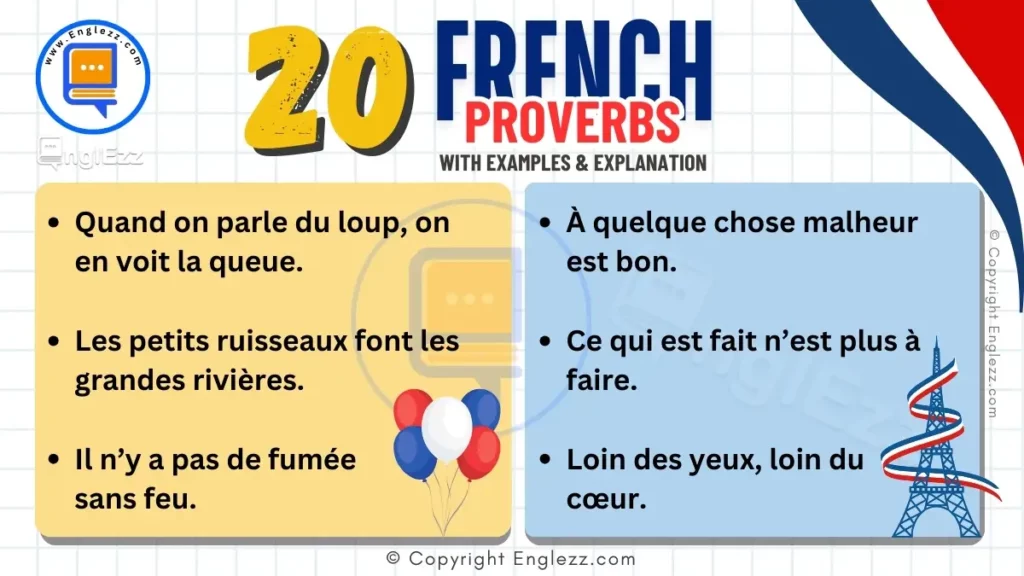Proverbs are an essential part of any language, reflecting the wisdom and cultural nuances passed down through generations. French proverbs, in particular, are known for their wit, depth, and practicality. These sayings are often used in everyday conversations, offering insights into life, love, and human nature. For language learners, understanding and using proverbs can significantly enhance fluency and cultural awareness. In this blog post, we’ll explore 20 popular French proverbs in English, each accompanied by its phonetic transcription, meaning, and examples of how it can be used in context.
Table of Contents
- 20 Most Common French Proverbs in English with Examples
- #1. 🐦 “Petit à petit, l’oiseau fait son nid.”
- #2. 🗝 “Il ne faut pas mettre la charrue avant les bœufs.”
- #3. 💧 “Après la pluie, le beau temps.”
- #4. 🕊 “Qui vivra verra.”
- #5. 👥 “L’union fait la force.”
- #6. 🎯 “Il n’y a pas de fumée sans feu.”
- #7. 🌍 “Les voyages forment la jeunesse.”
- #8. 🐢 “Rien ne sert de courir, il faut partir à point.”
- #9. 🌿 “C’est en forgeant qu’on devient forgeron.”
- #10. 🌱 “Il vaut mieux prévenir que guérir.”
- #11. ⚖ “À chacun son goût.”
- #12. 💼 “L’habit ne fait pas le moine.”
- #13. 📚 “On ne fait pas d’omelette sans casser des œufs.”
- #14. 🌟 “Mieux vaut tard que jamais.”
- #15. 💡 “À bon entendeur, salut.”
- #16. ⏳ “Chaque chose en son temps.”
- #17. 🔄 “Reculer pour mieux sauter.”
- #18. 🍀 “La fortune sourit aux audacieux.”
- #19. 🍇 “À quelque chose malheur est bon.”
- #20. 🚪 “Quand on parle du loup, on en voit la queue.”
- French Proverbs in English Table
- French Proverbs in English Printable
- Conclusion
20 Most Common French Proverbs in English with Examples
Whether you’re a beginner in French or looking to deepen your linguistic skills, these proverbs will not only enrich your vocabulary but also provide a window into French culture.
From expressions about love to sayings on wisdom, each proverb carries a lesson that transcends language barriers. So, let’s dive into the world of French wisdom and learn how these timeless proverbs can add value to your everyday conversations.
#1. 🐦 “Petit à petit, l’oiseau fait son nid.”
Phonetic Transcription: /pə.ti‿a pə.ti, lwa.zo fɛ sɔ̃ ni/
Translation: “Little by little, the bird builds its nest.”
Explanation: This proverb emphasizes the importance of patience and perseverance in achieving goals.
Example 1: “Success doesn’t come overnight. Remember, little by little, the bird builds its nest.”
Example 2: “She completed her degree while working full-time—little by little, the bird builds its nest.”
#2. 🗝 “Il ne faut pas mettre la charrue avant les bœufs.”
Phonetic Transcription: /il nə fo pa mɛtʁə la ʃa.ʁy‿avɑ̃ le bœf/
Translation: “You shouldn’t put the cart before the horse.”
Explanation: This proverb advises against rushing or doing things out of order.
Example 1: “We need to plan properly—you shouldn’t put the cart before the horse.”
Example 2: “Don’t rush into decisions; remember, you shouldn’t put the cart before the horse.”
#3. 💧 “Après la pluie, le beau temps.”
Phonetic Transcription: /a.pʁɛ la plɥi lə bo tɑ̃/
Translation: “After the rain, comes the sunshine.”
Explanation: This saying highlights that difficult times are often followed by better days.
Example 1: “Don’t worry about the setbacks—after the rain, comes the sunshine.”
Example 2: “The storm will pass—after the rain, comes the sunshine.”
#4. 🕊 “Qui vivra verra.”
Phonetic Transcription: /ki viv.ʁa ve.ʁa/
Translation: “He who lives, will see.”
Explanation: This proverb suggests that time will reveal the outcome of events.
Example 1: “I’m not sure how it will turn out, but he who lives, will see.”
Example 2: “Let’s wait and see—he who lives, will see.”

#5. 👥 “L’union fait la force.”
Phonetic Transcription: /ly.njɔ̃ fɛ la fɔʁs/
Translation: “Unity makes strength.”
Explanation: This proverb emphasizes the power of teamwork and collaboration.
Example 1: “We can achieve great things together—unity makes strength.”
Example 2: “The team succeeded because unity makes strength.”
#6. 🎯 “Il n’y a pas de fumée sans feu.”
Phonetic Transcription: /il nj‿a pa də fy.me sɑ̃ fø/
Translation: “There’s no smoke without fire.”
Explanation: This proverb suggests that rumors or suspicions usually have some truth to them.
Example 1: “People are talking about it—there’s no smoke without fire.”
Example 2: “Where there’s smoke, there’s fire—there’s no smoke without fire.”
#7. 🌍 “Les voyages forment la jeunesse.”
Phonetic Transcription: /le vwa.jaʒ fɔʁm la ʒø.nɛs/
Translation: “Travel forms youth.”
Explanation: This saying emphasizes the educational value of travel.
Example 1: “Travel while you’re young—travel forms youth.”
Example 2: “Exploring new cultures is important—travel forms youth.”
#8. 🐢 “Rien ne sert de courir, il faut partir à point.”
Phonetic Transcription: /ʁjɛ̃ nə sɛʁ də ku.ʁiʁ, il fo paʁ.tiʁ‿a pwɛ̃/
Translation: “There’s no point in running; you must leave on time.”
Explanation: This proverb suggests that preparation and timeliness are more important than speed.
Example 1: “It’s not about rushing—there’s no point in running; you must leave on time.”
Example 2: “Pace yourself—there’s no point in running; you must leave on time.”
#9. 🌿 “C’est en forgeant qu’on devient forgeron.”
Phonetic Transcription: /sɛ‿t‿ɑ̃ fɔʁ.ʒɑ̃ kɔ̃ də.vjɛ̃ fɔʁ.ʒə.ʁɔ̃/
Translation: “It’s by forging that one becomes a blacksmith.”
Explanation: This proverb means that practice makes perfect.
Example 1: “Keep practicing—it’s by forging that one becomes a blacksmith.”
Example 2: “Mastery comes with practice—it’s by forging that one becomes a blacksmith.”
#10. 🌱 “Il vaut mieux prévenir que guérir.”
Phonetic Transcription: /il vo mjø pʁe.vi.niʁ kə ge.ʁiʁ/
Translation: “It’s better to prevent than to cure.”
Explanation: This saying emphasizes the importance of precaution.
Example 1: “Be cautious—it’s better to prevent than to cure.”
Example 2: “Take precautions—it’s better to prevent than to cure.”
#11. ⚖ “À chacun son goût.”
Phonetic Transcription: /a ʃa.kœ̃ sɔ̃ ɡu/
Translation: “To each their own taste.”
Explanation: This proverb highlights the subjective nature of preferences.
Example 1: “You may not like it, but to each their own taste.”
Example 2: “Different strokes for different folks—to each their own taste.”
#12. 💼 “L’habit ne fait pas le moine.”
Phonetic Transcription: /la.bi nə fɛ pa lə mwan/
Translation: “The habit doesn’t make the monk.”
Explanation: This saying means that appearances can be deceiving.
Example 1: “Don’t judge by looks—the habit doesn’t make the monk.”
Example 2: “He may not look the part, but the habit doesn’t make the monk.”
#13. 📚 “On ne fait pas d’omelette sans casser des œufs.”
Phonetic Transcription: /ɔ̃ nə fɛ pa dɔ.m.lɛt sɑ̃ kɑ.se de zø/
Translation: “You can’t make an omelet without breaking eggs.”
Explanation: This proverb suggests that sacrifices are necessary to achieve something.
Example 1: “To make progress, you can’t make an omelet without breaking eggs.”
Example 2: “Change requires effort—you can’t make an omelet without breaking eggs.”
#14. 🌟 “Mieux vaut tard que jamais.”
Phonetic Transcription: /mjø vo taʁ kə ʒa.mɛ/
Translation: “Better late than never.”
Explanation: This proverb emphasizes that it’s better to do something late than not at all.
Example 1: “He finally apologized—better late than never.”
Example 2: “She completed her degree at 40—better late than never.”
#15. 💡 “À bon entendeur, salut.”
Phonetic Transcription: /a bɔ̃n ɑ̃.tɑ̃.dœʁ sa.ly/
Translation: “To the wise, a word is enough.”
Explanation: This saying suggests that a hint is enough for someone who understands well.
Example 1: “I’ve said enough—to the wise, a word is enough.”
Example 2: “He got the message—to the wise, a word is enough.”
#16. ⏳ “Chaque chose en son temps.”
Phonetic Transcription: /
ʃak ʃoz ɑ̃ sɔ̃ tɑ̃/
Translation: “Each thing in its own time.”
Explanation: This proverb means that everything has its right moment.
Example 1: “Be patient—each thing in its own time.”
Example 2: “Don’t rush—each thing in its own time.”
#17. 🔄 “Reculer pour mieux sauter.”
Phonetic Transcription: /ʁə.ky.le puʁ mjø so.te/
Translation: “To step back in order to leap better.”
Explanation: This proverb means that sometimes taking a step back can lead to greater progress.
Example 1: “She took a break from work to rethink her goals—to step back in order to leap better.”
Example 2: “Sometimes, it’s wise to pause—to step back in order to leap better.”
#18. 🍀 “La fortune sourit aux audacieux.”
Phonetic Transcription: /la fɔʁ.tyn su.ʁi o zo.da.sjø/
Translation: “Fortune smiles on the bold.”
Explanation: This saying suggests that taking risks can lead to success.
Example 1: “He invested in the startup because fortune smiles on the bold.”
Example 2: “Don’t be afraid to take risks—fortune smiles on the bold.”
#19. 🍇 “À quelque chose malheur est bon.”
Phonetic Transcription: /a kɛl.kə ʃoz malœʁ ɛ bɔ̃/
Translation: “Every cloud has a silver lining.”
Explanation: This proverb means that even bad situations can have positive outcomes.
Example 1: “Losing that job was tough, but every cloud has a silver lining.”
Example 2: “Even in hard times, remember—every cloud has a silver lining.”
#20. 🚪 “Quand on parle du loup, on en voit la queue.”
Phonetic Transcription: /kɑ̃ ɔ̃ paʁl dy lu ɔ̃n‿ɑ̃ vwa la kø/
Translation: “Speak of the devil and he appears.”
Explanation: This saying is used when someone you’ve been talking about suddenly shows up.
Example 1: “We were just talking about you—speak of the devil and he appears.”
Example 2: “It’s funny how that happens—speak of the devil and he appears.”
French Proverbs in English Table
Sure! Here’s a table with 20 French proverbs translated into English:
| 1. Time will tell. | 11. After the rain comes the sunshine. |
| 2. Little by little, the bird makes its nest. | 12. Better safe than sorry. |
| 3. Better late than never. | 13. Better to be alone than in bad company. |
| 4. Everyone sees noon at their doorstep. | 14. That’s life. |
| 5. The clothes do not make the man. | 15. He who chases two hares at once catches neither. |
| 6. No one is a prophet in their own country. | 16. A bird in the hand is worth two in the bush. |
| 7. There’s no smoke without fire. | 17. Every cloud has a silver lining. |
| 8. Small streams make big rivers. | 18. What’s done is done. |
| 9. Speak of the devil, and he shall appear. | 19. Out of sight, out of mind. |
| 10. To have the butter and the money from the butter. | 20. Better be the head of a lion than the tail of a fox. |
French Proverbs in English Printable

Conclusion
Understanding French proverbs can be a valuable tool in language learning, providing insight into the cultural wisdom that shapes the French-speaking world. These sayings, with their rich meanings and vivid imagery, offer lessons that are applicable in many aspects of life. As you incorporate these proverbs into your conversations, you’ll not only enhance your language skills but also deepen your appreciation of French culture.
Each proverb, with its phonetic transcription and practical examples, serves as a stepping stone towards greater fluency and cultural understanding. Whether you’re navigating everyday situations or contemplating life’s bigger questions, these proverbs can offer guidance and reflection.
Keep exploring the world of proverbs, and you’ll find that they are more than just phrases—they are windows into the soul of a culture. For more resources on language learning, don’t forget to check out EnglEzz’s courses, English exercises online, and a variety of educational materials available in the EnglEzz shop.









🌟 Dive into the timeless wisdom of French proverbs that can add a touch of elegance to your language skills! 🚀 Discover 20 carefully selected sayings with explanations and examples at
.
https://www.englezz.com/common-french-proverbs-in-english/
Enhance your French, and don’t forget to follow and like EnglEzz for more language insights!
#englezz #frenchproverbs #learnfrench #languagelearning #culturalinsights #frenchwisdom #languagelover